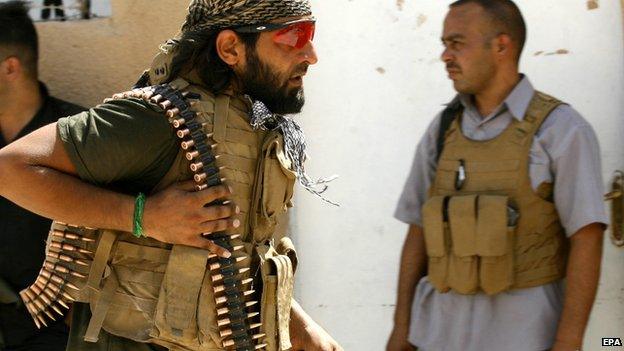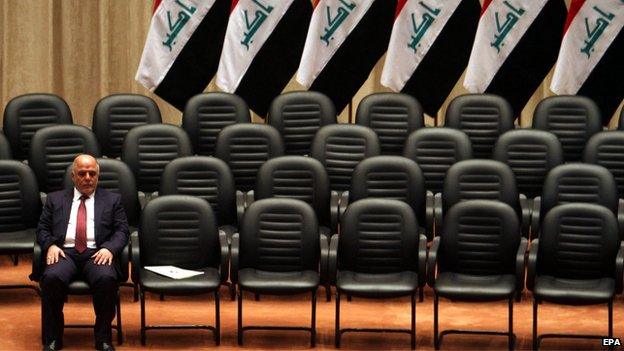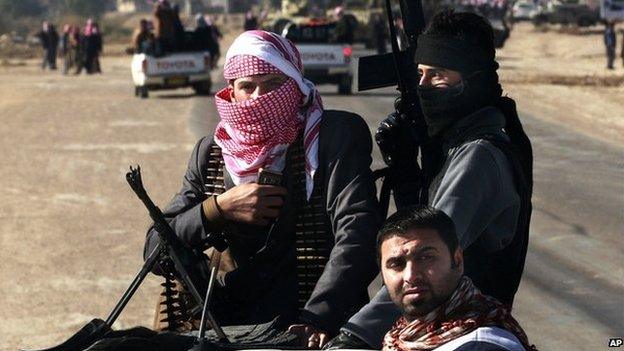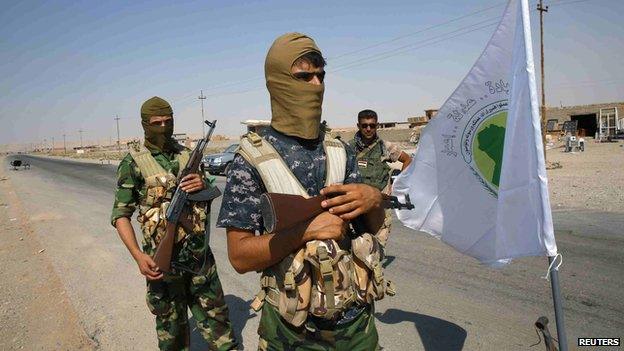Legacy of mistrust haunts new Iraqi government
- Published

Shia militias - rather than the Iraqi army - helped end the siege of Amerli
The new Iraqi government headed by Prime Minister Haider al-Abadi is a necessary first step in the process of pulling the country back together and leading a united national drive to oust the Islamic State (IS) radicals. But its success is far from guaranteed.
With Sunnis and Kurds fairly represented alongside the Shia majority, the cabinet has been hailed by the Americans as the "inclusive" new administration for which they were hoping and pushing.
Both the Sunnis and the Kurds had pulled out of the outgoing government of Nouri Maliki, who was widely blamed - including by Washington - for precipitating the current crisis by monopolising power and pursuing sectarian policies which alienated and marginalised the Sunnis in particular, fuelling grievances which the IS militants were swift to exploit.
Success or failure for the Abadi government in the grand endeavour to uproot IS will hinge on the extent to which it can meet those grievances, and convince the Sunni communities in whose areas the militants have taken root that they will have a reliably better future if they turn against the radicals and join the broader drive to oust them.
Without that, the Americans will find themselves backing one side in what is already in many ways a vicious sectarian civil war, fulfilling the warning by the former US commander in Iraq, David Petraeus, that they could end up becoming the air force of the Shia militias.

Haider al-Abadi has been tasked with forming a more inclusive government
That already happened 10 days ago, when US air strikes helped Iranian-backed Shia militias break the IS siege of the northern town of Amerli, with nominal support from Iraqi army forces and artillery backup from the Kurds.
Amerli may have been exceptional in that it is a Shia town. But Sunni villages around it, which had been caught up in the struggle and went along with IS whether they wanted to or not, have been trashed, and their inhabitants will never go back.
If the same formula is applied unchanged to the Sunni heartlands where IS has taken root, it will clearly be disastrous.
That is why the White House said, after a congratulatory phone call from US President Barack Obama to Prime Minister Abadi, that the two men had agreed on "the importance of having the new government quickly take concrete steps to address the aspirations and legitimate grievances of the Iraqi people".
This was clearly a reference to the Sunnis, and implied recognition that to bring them fully on board, much more will have to be done than simply giving them some seats in government.
In the political programme he announced to parliament before presenting his ministers, Mr Abadi proposed widespread devolution to the provinces, including security, in which local people would be engaged in "forming national guards that will be the main pillar for security in the governorates".
Past grudges
If followed through swiftly and sincerely, measures proposed by Mr Abadi would go a long way towards meeting bitter Sunni complaints about marginalisation, victimisation and oppression.
But the legacy of mistrust is strong. Sunni tribal and former military rebels, who turned on al-Qaeda and expelled it from western Anbar province in 2007, felt betrayed when promises made by Baghdad were not fulfilled.
They say they are willing to join the campaign to oust IS now, but they want international guarantees of some sort that there will be a new deal for them, and that they will not be sidelined again.

The so-called Awakening militias are the legacy of an earlier attempt to co-opt Sunni rebels
Empowering the Sunnis to take on IS themselves, albeit with outside help, might mean that the Americans and others have to work with Sunni rebels who took up arms against them after 2003.
But they did that before, from 2007 on with the Awakening Councils - Sunni tribal militants who had been aligned to al-Qaeda but turned around.
The Shia militias for whom the Americans provided air cover at Amerli were the same who battled US troops on the ground - even abducting and killing American soldiers - during those same years.
All concerned seem willing to shelve past grudges to combat what they see as the bigger and more imminent and existential threat posed by IS.

The Badr Brigades, backed by Iran, remain a powerful force in Iraqi politics
For the Americans, and for the Iraqi Shia and Kurds, that may even mean working with Saddam Hussein's former Baathist adherents, who make up a significant part of the hard core of the Sunni nationalist rebellion.
All of this because the Iraqi army as such is currently in disarray, as evidenced by its spectacular collapse within hours when IS overran Mosul and much of the north in June. Reconstructing it into a cohesive fighting force is not something that can be done overnight.
To defend Baghdad and its approaches, Mr Maliki was forced to mobilise the same Shia militias against which he threw the Iraqi army into battle in 2008, under the slogan of "imposing the law".
Personal patronage
One of the first practical challenges still facing his successor, Mr Abadi, is to fill the key jobs of defence and interior ministers, which he had to leave open - he said for only a week - because there was no consensus on the candidates.
Defence had been expected to go to a Sunni, while the man most cited as the next interior minister, Hadi al-Amiri, is the leader of one of the Shia militias, the heavily Iranian-backed Badr organisation - something the Sunnis would clearly find hard to swallow.
The challenge will be to try to forge the military and security apparatus into truly national institutions, not sectarian fiefdoms.
Mr Maliki had kept his own hands firmly on the strings and built up a strong system of personal patronage in both ministries, including elite units - the Golden Brigades - answerable only to himself.
He has now been made one of three Vice-Presidents, normally prestige posts with little real power.
But one unanswered question is whether he may be able to use that base to continue pulling some of the security strings, especially if the new ministers fail to get a grip.